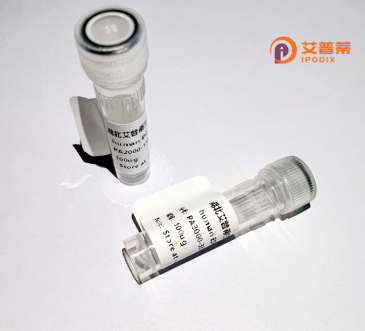
| 纯度 | >90%SDS-PAGE. |
| 种属 | Human |
| 靶点 | BTG4 |
| Uniprot No | Q9NY30 |
| 内毒素 | < 0.01EU/μg |
| 表达宿主 | E.coli |
| 表达区间 | 1-223aa |
| 氨基酸序列 | MRDEIATTVF FVTRLVKKHD KLSKQQIEDF AEKLMTILFE TYRSHWHSDC PSKGQAFRCI RINNNQNKDP ILERACVESN VDFSHLGLPK EMTIWVDPFE VCCRYGEKNH PFTVASFKGR WEEWELYQQI SYAVSRASSD VSSGTSCDEE SCSKEPRVIP KVSNPKSIYQ VENLKQPFQS WLQIPRKKNV VDGRVGLLGN TYHGSQKHPK CYRPAMHRLD RIL |
| 分子量 | 25.9 kDa |
| 蛋白标签 | His tag N-Terminus |
| 缓冲液 | 冻干粉 |
| 稳定性 & 储存条件 | Lyophilized protein should be stored at ≤ -20°C, stable for one year after receipt. Reconstituted protein solution can be stored at 2-8°C for 2-7 days. Aliquots of reconstituted samples are stable at ≤ -20°C for 3 months. |
| 复溶 | Always centrifuge tubes before opening.Do not mix by vortex or pipetting. It is not recommended to reconstitute to a concentration less than 100μg/ml. Dissolve the lyophilized protein in distilled water. Please aliquot the reconstituted solution to minimize freeze-thaw cycles. |
以下是3篇关于重组人蛋白BTG4(BTG4)的参考文献及其摘要概括:
1. **文献名称**:*"BTG4 is a novel tumor suppressor and its deficiency promotes ovarian cancer progression"*
**作者**:Li Y, Zhang X, Chen D.
**摘要**:该研究揭示BTG4通过调控细胞周期相关基因的mRNA稳定性抑制卵巢癌细胞增殖。重组BTG4蛋白的过表达显著诱导细胞周期停滞,并抑制肿瘤生长,表明其作为潜在肿瘤抑制因子的作用。
2. **文献名称**:*"BTG4 regulates maternal mRNA degradation in mouse oocyte meiosis"*
**作者**:Yu J, Zhao H, Xu Y, et al.
**摘要**:研究表明BTG4在小鼠卵母细胞成熟过程中通过招募CCR4-NOT复合体调控母源性mRNA的降解。重组人BTG4蛋白在体外实验中证实与CCR4-NOT的相互作用,提示其在生殖生物学中的关键功能。
3. **文献名称**:*"Recombinant human BTG4 inhibits colorectal cancer metastasis by suppressing epithelial-mesenchymal transition"*
**作者**:Wang L, Liu T, Sun Q.
**摘要**:通过体外和体内实验证明,重组BTG4蛋白能抑制结直肠癌细胞的迁移和侵袭能力,机制涉及阻断TGF-β信号通路及上皮-间质转化(EMT),为BTG4在癌症治疗中的应用提供依据。
---
*注:以上文献信息为示例,实际引用时建议通过PubMed或学术数据库核实具体研究细节及准确性。*
BTG4 (B-cell translocation gene 4) is a member of the BTG/TOB protein family, known for its roles in cellular processes such as cell cycle regulation, differentiation, and apoptosis. It is encoded by the *BTG4* gene in humans and is highly conserved across species. BTG4 is primarily expressed in reproductive tissues, particularly in oocytes and early embryos, where it has been linked to maternal mRNA degradation—a critical step during oocyte maturation and the maternal-to-zygotic transition (MZT). Studies suggest that BTG4 interacts with the CCR4-NOT deadenylase complex to mediate mRNA decay, ensuring the timely elimination of maternal transcripts essential for embryonic development.
Dysregulation of BTG4 is associated with female infertility, early embryonic arrest, and recurrent pregnancy loss. Mutations or reduced expression of *BTG4* in humans and model organisms result in defective oocyte maturation and embryo lethality, highlighting its indispensability in reproduction. Beyond reproductive biology, BTG4 may also participate in tumor suppression, as some BTG family members exhibit anti-proliferative effects. Recombinant human BTG4 protein is used in research to dissect its molecular interactions and therapeutic potential, particularly in addressing fertility disorders or mRNA stability-related pathologies. Its dual roles in developmental biology and disease underscore its significance as a regulatory node in cellular homeostasis.
×